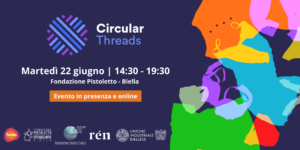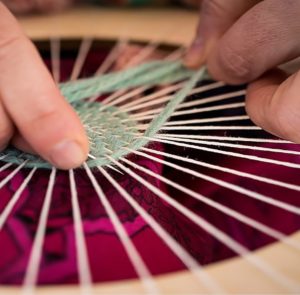To promote the transition towards a circular economy in the textile industry through a first assessment of the level of sustainability and circularity of the sector and of the single companies: it is around this objective that Circular Threads, the first Italian study on the relationship between textile industry and circular economy, has developed. Behind the scenes of the project are Tondo, Fondazione Pistoletto, the Textile and Health Association and Rén, who will present the work at Cittadellarte on Tuesday 22nd June. “The textile industry – reads the dedicated press release – is a crucial sector of the Italian economy. The adoption of production models based on the principles of circular economy would allow this sector to become not only more sustainable, but also more resilient, efficient and profitable”. The research, which involved around 300 companies, was conducted on three levels of analysis (desk search, questionnaire, measurement of circularity) and has provided an overview of the current situation in the sector, with the ultimate goal of understanding the existing gaps and accelerating the transition towards a circular economy in the textile industry, also thanks to the identification of best practices and the main challenges to be faced.

The meeting
The event of 22nd June, organised in partnership with the Biellese Industrial Union, will be an opportunity for companies in the sector to network. Among the participants will be the representatives of three innovative companies that have decided to actively participate in the research by submitting one of their projects to a complete circularity analysis. They are the Graphi-Tee t-shirt developed by Wrad, the Supernova and Ecotec yarn by Marchi & Fildi and the project Circular Fashion Made in Italy by Rifò, which will therefore be presented as case studies. New trends on sustainability and circularity in the textile and fashion sectors will be discussed with a series of national guest experts, such as Marco Capellini, Rossella Ravagli and Giusy Cannone. The event will also rely on important local contributors: Successori Reda, Vitale Barberis Canonico and Fratelli Piacenza, some of the most relevant textile companies in the territory, will illustrate the sustainability and circularity projects implemented in their businesses. The day will conclude with a discussion on the actions and levers that can support the circular transition, with the participation of the Biellese Industrial Union, the Italian Fashion System, the Textile and Health Association, Rén, UNECE and Cittadellarte. Among the numerous speakers – click here to view the full programme – will be Paolo Naldini (director of Cittadellarte), Olga Pirazzi (head of Cittadellarte’s Fashion Office) and Rossella Ravagli (director of the course in Sustainable Fashion of Accademia Unidee).

The workshop
During the day, the companies will also have the opportunity to participate in a workshop organised with the aim of exploring practices of circular economy in the textile sector, in particular by analysing the following topics: suppliers, materials and products, management of waste. The event will be held in mixed modality: you can participate in person at Cittadellarte or you can follow the event online. More information is available at this link, where you can view the full programme and register for the event.

The comments
“Particular attention – said Nicoletta Stecca, vice-president of the Rén collective – will be reserved for micro and small enterprises operating in sustainable fashion called to play an unprecedented but crucial role in the relaunching of a system based on quality, craftsmanship and creativity. The Rén collective will be the spokespeople for the demand for a change starting from the bottom and amplified by digitisation and ‘g-localism’, bringing to light the key role of these small players, at the centre of responsible growth strategies also at a European level”.
Marco Piu, director of the Textile and Health Association, identified the key actions necessary to achieve the ethical objectives of the companies in the sector: “Measuring sustainability, knowing how to enhance it without falling into the clichés of greenwashing and maintaining high ethical values are the factors that can help manufacturers to differentiate themselves”.
Alberto Monti, Head of Research at Tondo, then highlighted the prospects of the research: “The desire to conduct this study stems from the awareness of the existence of a series of critical issues that the textile sector has to face, but also from the belief that the principles of circular economy can serve not only to make the entire sector more sustainable, but also more productive, profitable and innovative. In this sense, circular economy represents the most suitable response to the challenges of the present and a tool that can lead this sector, which plays a strategic role for our country, into the future”.
“It does not make any sense to talk about sustainability and circularity – argued Paolo Naldini, director of Cittadellarte – if we don’t say where and how they are understood and implemented. Practice and territory are essential to any claim that is not purely rhetorical or greenwashing. Cittadellarte starts from the Biella area, the heart of textile manufacturing and the place where in 2009 it established the Biella Ethical Sustainable Think-tank and an Academy dedicated to sustainable fashion, it works nationally, internationally and globally, and always returns to Biella, where it has created a civil, entrepreneurial and cultural movement that is at the forefront of the challenges that the whole world feels urgent. The collaboration with Tondo – he concluded – should therefore be read as Cittadellarte’s commitment to bring know-how and operational devices to the territory in which it is based, to make the Biellese the new myth, where economy and ecology, prosperity and sustainability, art and nature meet”.

